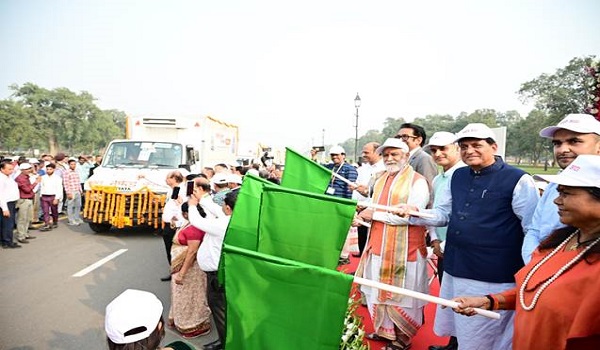The Union Minister for Consumer Affairs, Food, and Public Distribution, Piyush Goyal, flagged off a fleet of 100 mobile vans dedicated to the sale of ‘Bharat Atta.’ This initiative is part of a concerted effort to make Bharat Atta readily accessible to consumers, not only through physical retail outlets but also via the mobile vans operated by the National Agricultural Cooperative Marketing Federation of India (NAFED), the National Cooperative Consumers’ Federation of India Limited (NCCF), and Kendriya Bhandars.
Consumers can purchase ‘Bharat Atta’ at the attractive price of Rs. 27.50 per kilogram at these cooperative outlets. Minister Goyal disclosed that a substantial allocation of 2.5 lakh tonnes of wheat has been set aside for the production of ‘Bharat Atta,’ and this strategic move is geared towards further curbing inflation.
This initiative builds upon an earlier directive issued in February, whereby Kendriya Bhandar, the National Agricultural Cooperative Marketing Federation of India (NAFED), and the National Cooperative Consumers’ Federation of India Limited (NCCF) were tasked with procuring up to 3 lakh metric tonnes of wheat from FCI depots. Subsequently, they were to process it into Atta and offer it to consumers at the price of Rs. 29.50 per kilogram through a range of retail outlets and mobile vans.
In addition, the Food Corporation of India (FCI) recently executed the sale of 2.87 lakh tonnes of wheat from its buffer stock to bulk consumers in the 19th round of e-auction. FCI has been systematically selling wheat and rice from the Central Pool to bulk buyers, including flour millers and small traders, as part of the Open Market Sale Scheme (OMSS) since June. This weekly e-auction process aims to regulate the retail prices of these vital commodities.
The e-auction attracted 2,389 bidders, resulting in the sale of 2.87 lakh tonnes of wheat. The weighted average selling price was Rs 2,291.15 per quintal for fair and average-quality wheat, surpassing the reserve price of Rs 2,150 per quintal.
The sale of wheat under the Open Market Sale Scheme will persist until March 31, 2024, with approximately 101.5 lakh tonnes of wheat slated for offloading during this period.
Furthermore, Prime Minister Narendra Modi recently announced an extension of the free food grains program by five years to safeguard 80 crore consumers from escalating cereal prices ahead of an impending general election. This extension will lead to increased government spending and more extensive procurement of wheat and rice from farmers, ensuring the welfare program’s continuity, which offers free grains to over 800 million people. The free grain program is estimated to cost the government around Rs 2 lakh crore annually and was initially set to conclude at the end of the year.
India, the world’s second-largest producer of wheat and rice, has already imposed restrictions on the export of both grains to stabilize domestic prices in response to rising demand in the local market.


